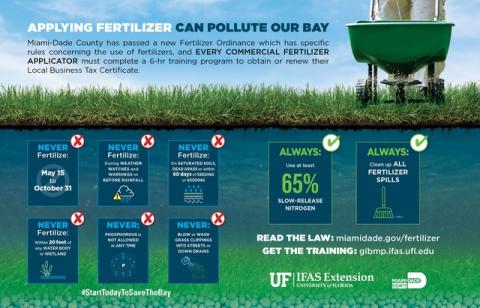About
The beginning of the rainy season in Miami-Dade County is May 15. During this season, residents, landscape companies, and condominium associations, among others, are prohibited from using fertilizer. Fertilizer runoff was shown as one of the top contributors to last year’s fish kill in Biscayne Bay, along with rising temperatures and lack of oxygen. The rainy season is in effect through October 31st.
For more information on the Fertilizer Ordinance please visit Miami-Dade County Fertilizer Ordinance. The City of Coral Gables’ greenspace management division follows the new county ordinance on Fertilizer as outlined below.

What is Nutrient Pollution?
Nutrients, like nitrogen and phosphorus, are naturally occurring – but can be too much of a good thing when found in high concentrations in our waterways. Nutrient pollution can contribute to algae blooms. Algae blooms turn the water green and smell terrible, smothering seagrass and killing fish -- they can even be harmful to humans.
Additional Tips to Reduce Nutrient Runoff Pollution
- Minimize or eliminate fertilizer, herbicide and pesticide use or switch to organic varieties that are not harmful
- Plant native plants – they are naturally adapted to our climate and don’t require a lot of water and fertilizer
- Avoid over-watering your lawn
- Use mulch instead of herbicides to help control weeds
- Sweep up debris – don’t hose down your driveway
Best Management Practices
BMPs should integrate selection, irrigation, fertilization, and pest management in a manner that minimizes environmental impacts, yet meets expectations. Irrigation practices influence how often we need to fertilize, and this can affect the occurrence of pest problems. Weigh these and other factors when making landscape management decisions.
Palms - We use a slow release 8-0-12 (polymer and sulfate coated) fertilizer that we apply three times a year: Spring (mid-March), Early Summer (mid-May) and Fall (October 1st).
Shrubs - once or twice a year with 8-0-12 (Polymer and sulfate coated) fertilizer or similar product, once or twice a year: October/November and April/May.
Zoysia - We use four times a year a slow release 11-4-11 or similar product
Acid loving plants - To correct nutritional deficiencies on plants such as perennial peanuts, ixoras and gardenias, we drench a mix of Potassium, Magnesium, Manganese, Key Plex and sequester/chelated iron in the EDDHA form.
Herbicide - As an alternative to Round Up, we use EcoMight’s WOW to control weeds.
Beehive removal - Beehive removals will be done only to beehive that are located between ground level and 20 feet up. If it is permitted, it will be a live beehive removal. In case that beehive colony has been Africanized and/or has parasite, it will be fumigated.
